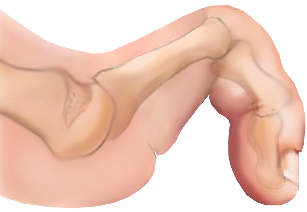Clawfoot (Claw Toe)

Clawfoot is also known as claw toes. This condition occurs when your toes bend into a claw-like pose. Sometimes, claw toe appears from birth. However, it can also become bent later in life.
Commonly, this condition is not an issue. However, claw toes can be uncomfortable. Furthermore, it can also be a sign of an underlying condition such as diabetes or cerebral palsy.
Also, see: Common Foot Problems Associated with Diabetes.
It’s crucial to seek medical attention if you suspect clawfoot. If you receive an early diagnosis, you can prevent the condition from worsening.
Symptoms of Claw Toe
When claw foot occurs, the toe joints that are closest to your ankle will point up. Then, the other toe joints will bend down. Therefore, making it appear like claws.
It’s common for this condition to not cause pain. On the other hand, your toes may become painful, and you can develop corns or calluses from parts rubbing against your shoes.
Claw feet are often mistaken for hammertoes. Both hammer toe and claw toes share similarities there causes are by different feet muscles.
What Causes Clawfoot?
When clawfoot occurs, it’s due to a resulting factor of different conditions. Examples are the development of claw toes after ankle surgery or an ankle injury. Therefore, nerve damage will weaken the foot muscles. Leading to imbalances forcing your toes to bend awkwardly. Another cause is inflammation from an underlying condition.
So, disorders that can cause flaw foot are as follows:
Diabetes. When your body has increased blood sugar levels due to insulin production, or resistance, diabetes occurs. And, foot nerve damage can occur as one of the complications that result from this condition.
Rheumatoid Arthritis (RA): When you have RA, your immune system attacked healthy tissues in your joints. Therefore, the lining of your joints become inflamed. Thus, causing joint deformities.
Stroke. This condition occurs when blood has stopped flowing to your brain due to a clot or weak blood vessels. Furthermore, a stroke can cause significant damage to your muscles, including your feet.
Cerebral palsy (CP). A condition that affects your muscle tone is called cerebral palsy. Therefore, resulting in muscles that are too loose or stiff. CP can be caused by abnormal brain development during delivery or before birth.
Charcot-Marie-Tooth disease (CMT). When you experience Charcot disease, it is a rare, inherited nervous system disease. This condition causes weakness and toe deformities in your feet.
